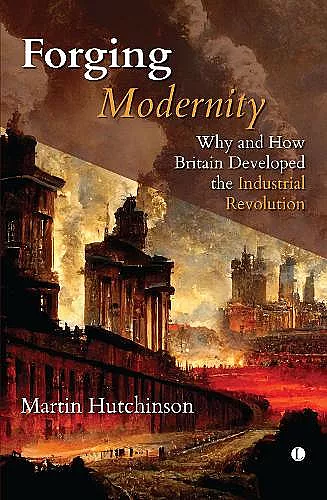Forging Modernity
Why and How Britain Developed the Industrial Revolution
Format:Paperback
Publisher:James Clarke & Co Ltd
Published:30th Nov '23
Currently unavailable, our supplier has not provided us a restock date

The Industrial Revolution provided the greatest increase in living standards the world has ever known while propelling Britain to dominance on the global stage. In Forging Modernity, Martin Hutchinson looks at how and why Britain gained this prize ahead of its European competitors. After comparing their endowments and political structures as far back as 1600, he then traces how Britain, through better policies primarily from the political Tory party, diverged from other European countries. Hutchinson's Harvard MBA allows a unique perspective on the early industrial enterprises - many successes resulted from marketing, control systems and logistics rather than from production technology alone, while on a national scale the scientific method and commercial competition were as important as physical infrastructure. By 1830, through ever-improving policies, Britain had built a staggering industrial lead, half a century ahead of its rivals. Then the Tories lost power and policy changed forever. In his conclusion, Hutchinson shows how changes welcomed by conventional historians caused the decline of Industrial Britain. Nevertheless, the policies that drove growth, ingenuity and rising living standards are still available for those bold enough to adopt them.
1. 'This timely book reminds us what a great achievement the Industrial revolution in Britain was in the period 1660-1830, taking living standards far higher than on the continent for the many and witnessing a flowering of new products and technologies. Furthermore, it gave ideas to the world to raise their wages and wealth as they caught up in the nineteenth century. Hutchinson explains why this happened first in Britain, and how Tory politics helped by allowing local and entrepreneurial diversity and experimentation without heavy handed taxation and regulation. It is refreshing to be told that there is a lot good about economic growth, freeing people from poverty and extending opportunities for many to earn and save more and enjoy a better lifestyle.' - Rt Hon. Sir John Redwood, MP for Wokingham 2. 'An entertaining, splendid and stunningly original history of one of the most important events of human history, Forging Modernity explores the origins of the Industrial Revolution when human living standards were pulled up from grinding Malthusian poverty and onto the path to modern levels of prosperity. Why did the industrial revolution occur first in Britain, and what was its main cause? Hutchinson\rquote s answer is that it occurred thanks to Britain strong property rights and the relative lack of state interference in the economy. Its intellectual roots are to be found in the royalism of the post-Restoration period, which was to find its apogee in the high Toryism of the eighteenth century. And had it not been for the Whigs\rquote grubby meddling early in that century, the Industrial Revolution might have occurred half a century before it did. At long last, a Tory and not a Whig interpretation of history!' - Professor Kevin Dowd, Durham University 3.An interesting and well-written new book about the deep historical causes of modern economic growth, Forging Modernity is an excellent example of old-school economic history, rich in detail and fine reading on a cold winter night, huddled together with loved ones for warmth, thanks to war, inflation, and plummeting economic freedom.- Robert E. Wright, American Institute for Economic Research, February 2023 4.The long-neglected Tory model of industrialisation that Martin Hutchinson has done so much to recover created the conditions for modernity, and the model forged in the UK was copied across the world. Its abandonment first by an insouciant Victorian liberalism and latterly by a post-Cold War progressivism has distorted the understanding of the conditions that gave the United Kingdom its wealth and prestige. Subordinating the past to the present has left us with a woke version of the Whig interpretation of history that requires atonement for past political and environmental sins. This post-industrial vision of the UK offers a carbonfree, public-service economy, guilty about its past and progressively immiserated. David Martin Jones in Quadrant January-February 2024, pp.40-45. 5.
ISBN: 9780718896898
Dimensions: unknown
Weight: unknown
450 pages